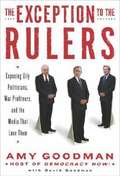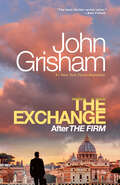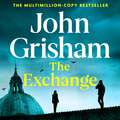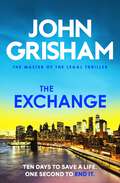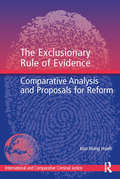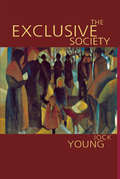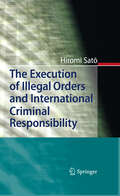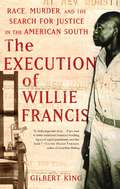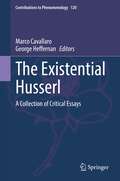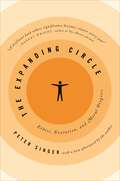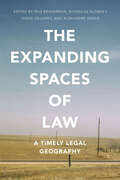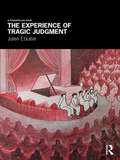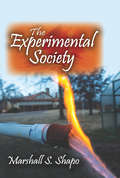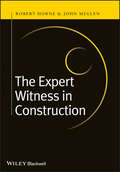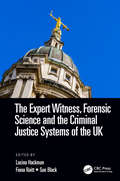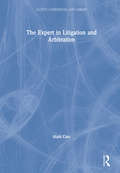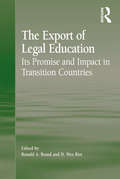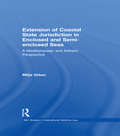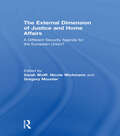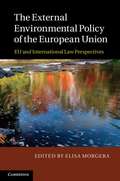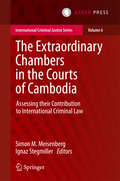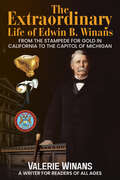- Table View
- List View
The Exception to the Rulers: Exposing Oily Politicians, War Profiteers, and the Media that Love Them
by Amy Goodman David GoodmanHost of Pacifica Radio's Democracy Now! Analyzes world events.
The Exchange: After The Firm (The Firm Series #2)
by John Grisham#1 NEW YORK TIMES BESTSELLER • John Grisham delivers high-flying international suspense in a stunning legal thriller that marks the return of Mitch McDeere, the brilliant hero of The Firm. &“A breathtaking update on the McDeeres and the life they made . . . Grisham, in vintage form, ratchets up the suspense in this winning sequel.&” —The Wall Street Journal What became of Mitch and Abby McDeere after they exposed the crimes of Memphis law firm Bendini, Lambert & Locke and fled the country? The answer is found in The Exchange, the riveting sequel to The Firm, the blockbuster thriller that launched the career of America&’s favorite storyteller.It is now fifteen years later, and Mitch and Abby are living in Manhattan, where Mitch is a partner at the largest law firm in the world. When a mentor in Rome asks him for a favor that will take him as far as Istanbul and Tripoli, Mitch finds himself at the center of a sinister plot that has worldwide implications. Once again Mitch&’s colleagues, friends, and family are targeted. Mitch is a master at staying one staying one step ahead of his adversaries, but this time there&’s nowhere to hide.Don&’t miss Framed, John Grisham&’s first work of nonfiction since The Innocent Man, and look for his upcoming novel, The Widow!
The Exchange: After The Firm - The biggest Grisham in over a decade
by John Grisham***THE GRISHAM YOU'VE BEEN WAITING FOR***The riveting sequel to THE FIRM, the blockbuster thriller that launched the career of the world's bestselling author.What became of Mitch and Abby McDeere after they exposed the crimes of Memphis law firm Bendini, Lambert and Locke and fled the country?The answer is in THE EXCHANGE, the riveting sequel to THE FIRM, the blockbuster thriller that launched the career of the world's bestselling author.It is now fifteen years later, and Mitch and Abby are living in Manhattan, where Mitch is a partner at the largest law firm in the world. When a mentor in Rome asks him for a favour that will take him far from home, Mitch finds himself at the centre of a sinister plot that has worldwide implications - and once again endangers his colleagues, friends and family.(P)2023 Penguin Random House Audio
The Exchange: The gripping crime thriller from the number 1 Sunday Times bestselling author
by John GrishamJohn Grisham's epic follow-up to his phenomenal global bestseller The Firm... TEN DAYS TO SAVE A LIFE. ONE SECOND TO END IT.Mitch McDeere has cheated death and come out the other side.Fifteen years ago, he stole millions from the mob and disappeared. Now, with his enemies jailed or dead, he has fought his way to the top of the biggest law firm in the world.When a new case takes him to Libya, he finds himself in the middle of the biggest hostage negotiation in recent history. The terrorists want $100 million in 10 days. Lives are on the line: and for McDeere, it's personal.The clock is ticking. The stakes are high. And there's nowhere left for McDeere to hide...💥350+ million copies, 45 languages, 10 blockbuster films: JOHN GRISHAM IS THE MASTER OF THE LEGAL THRILLER 💥Praise for The Exchange:'John Grisham remains one of the modern legends of literary fiction' ⭐⭐⭐⭐⭐ 'Amazing' ⭐⭐⭐⭐⭐ 'Gripping' ⭐⭐⭐⭐⭐ 'Riveting and full of suspense' ⭐⭐⭐⭐⭐ 'A very good read' ⭐⭐⭐⭐⭐
The Exclusionary Rule of Evidence: Comparative Analysis and Proposals for Reform (International and Comparative Criminal Justice)
by Kuo-hsing HsiehThis groundbreaking monograph asserts the need for the establishment of an exclusionary rule of evidence in China as a means of protecting the people from police wrongdoing. The author skilfully explores the foundations and developments of the exclusionary rule in the UK and USA, assessing the rule from a comparative perspective and illuminating some issues that may arise in transferring the rule from one legal system to another. Divided into two parts, the first part discusses lessons from the past, and provides an in-depth examination of the development of the exclusionary rule in the UK and USA, covering rationales, debates and the theoretical foundation of the exclusionary rule in the constitutional context. The second part looks to the future and the establishment of a Chinese exclusionary rule. Specifically, it analyses the effects of police torture, the passive attitude of judges and the need to establish such a rule in practice for future protection of human rights. The author’s experience in criminal law and procedure allow him to adroitly analyse crucial issues on both theoretical and practical level that is understandable to those working in the areas of human rights, comparative criminal procedure, and the Chinese legal system.
The Exclusive Society: Social Exclusion, Crime and Difference in Late Modernity
by Professor Jock YoungIn this major new work, which Zygmunt Bauman calls a 'tour de force of breathtaking erudition and clarity', Jock Young charts the movement of the social fabric in the last third of the twenthieth century from an inclusive society of stability and homogeneity to an exclusive society of change and division. Jock Young, one of the foremost criminologists of our time, explores exclusion on three levels: economic exclusion from the labour market; social exclusion between people in civil society; and the ever-expanding exclusionary activities of the criminal justice system. Taking account of the massive dramatic structural and cultural changes that have beset our society and relating these to the quantum leap in crime and incivilities, Jock Young develops a major new theory based on a new citizenship and a reflexive modernity.
The Execution of Illegal Orders and International Criminal Responsibility
by Hiromi SatoThe legal consequence of the superior orders defense has long been debated as one of the major problems in international criminal law. Several controversial issues such as the immunity of the state, the absolute character of military discipline, and immunity on the grounds of mistake of law and/or coercion have been complexly interwoven in the debates. The Execution of Illegal Orders and International Criminal Responsibility provides a comprehensive portrait of the relevant debates at the international level up to the present, analyzes the conflicting views, and shows the significance of the development of international rules for the superior orders defense as well as the implication of the fact that issues concerning some detailed or related rules have been left unresolved. This study presents to present a new standpoint not only on dealing with the problem of the superior orders defense but also on reconsidering the international stipulation of rulemaking with regard to criminal matters.
The Execution of Willie Francis: Race, Murder, and the Search for Justice in the American South
by Gilbert KingOn May 3, 1946, in St. Martinsville, Louisiana, a seventeen-year-old black boy was scheduled for execution by electric chair. Willie Francis had been charged with murder; his trial had been brief; his death sentence never in doubt. When the executioners flipped the switch, Willie screamed and writhed as electricity coursed through his body. But Willie Francis did not die. Having miraculously survived, Willie was informed that the state would attempt to execute him a second time within a week. The ensuing legal battle went all the way to the Supreme Court, asking: Could the state electrocute someone twice? A gripping narrative about a brutal crime and its shocking aftermath, The Execution of Willie Francis offers a heroic--and ultimately tragic--tale of one man's quest for moral justice in a nation still blinded by race.
The Existential Husserl: A Collection of Critical Essays (Contributions to Phenomenology #120)
by Marco Cavallaro George HeffernanThis book examines Husserl’s approach to the question concerning meaning in life and demonstrates that his philosophy includes a phenomenology of existence. Given his critique of the fashionable “philosophy of existence” of the late 1920s and early 1930s, one might think that Husserl posited an opposition between transcendental phenomenology and existential philosophy, as well as that in this respect he differed from existential phenomenologists after him. But texts composed between 1908 and 1937 and recently published in Husserliana XLII, Grenzprobleme der Phänomenologie (2014), show that the existential Husserl was not opposed but open to the phenomenological investigation of several basic topics of a philosophy of existence. A collection of contributions from a team of internationally recognized scholars drawing on these and other sources, the present volume offers insights into the relationship between phenomenology and philosophy of existence. It does so by (1) delineating the basic outlines of Husserl’s phenomenology of existence, (2) reinterpreting the tension between Husserl’s transcendental phenomenology and Jaspers’s and Heidegger’s philosophy of existence as well as Kierkegaard’s and Sartre’s existentialism, and (3) investigating the existential aspects of Husserl’s phenomenological ethics. Thus focusing on neglected aspects of Husserl’s thought, the volume shows that there is a consensus between classical phenomenology and existential phenomenology on the urgency of addressing the existential questions that in The Crisis of the European Sciences and Transcendental Phenomenology (1936) Husserl calls “the questions concerning the meaning or meaninglessness of this entire human existence”. The Existential Husserl represents a major contribution to the clarification of the historical and philosophical developments from transcendental phenomenology to existential phenomenology. The book should appeal to a wide audience of many readers at all levels looking for phenomenological answers to existential questions.
The Expanding Circle: Ethics, Evolution, and Moral Progress
by Peter SingerWhat is ethics? Where do moral standards come from? Are they based on emotions, reason, or some innate sense of right and wrong? For many scientists, the key lies entirely in biology--especially in Darwinian theories of evolution and self-preservation. But if evolution is a struggle for survival, why are we still capable of altruism? In his classic study The Expanding Circle, Peter Singer argues that altruism began as a genetically based drive to protect one's kin and community members but has developed into a consciously chosen ethic with an expanding circle of moral concern. Drawing on philosophy and evolutionary psychology, he demonstrates that human ethics cannot be explained by biology alone. Rather, it is our capacity for reasoning that makes moral progress possible. In a new afterword, Singer takes stock of his argument in light of recent research on the evolution of morality.
The Expanding Spaces of Law: A Timely Legal Geography
by Irus Braverman Nicholas Blomley David Delaney Alexandre Sandy KedarThe Expanding Spaces of Law presents readers with cutting-edge scholarship on legal geography and pushes the current boundaries of the field, investigating new questions and reinvigorating previous modes of inquiry. Legal geography has contributed a great deal to understanding the many relationships between space and law. Earlier work has explored space that is static, such as the law's interaction with concepts of the home, public space, prison, restrooms, camps, territories, and nation states. But the past few years have seen an emphasis on analyzing the dynamic workings of space, and the understanding of space in various new ways. The Expanding Spaces of Law asks readers to consider what legal geography would look like if we were to give more prominence to conceptions of space as process, space as event, or space as situation or relationship. Questions of space and time are often implicit in the work of legal geographers, and this book seeks to bring these questions to the fore. The Expanding Spaces of Law brings together some of the most prominent names in the field, and includes new voices in the field from around the world to introduce provocative and exciting research in legal geography.
The Expanding Spaces of Law: A Timely Legal Geography
by Irus Braverman Nicholas Blomley David Delaney Alexandre Sandy KedarThe Expanding Spaces of Law presents readers with cutting-edge scholarship on legal geography and pushes the current boundaries of the field, investigating new questions and reinvigorating previous modes of inquiry. Legal geography has contributed a great deal to understanding the many relationships between space and law. Earlier work has explored space that is static, such as the law's interaction with concepts of the home, public space, prison, restrooms, camps, territories, and nation states. But the past few years have seen an emphasis on analyzing the dynamic workings of space, and the understanding of space in various new ways. The Expanding Spaces of Law asks readers to consider what legal geography would look like if we were to give more prominence to conceptions of space as process, space as event, or space as situation or relationship. Questions of space and time are often implicit in the work of legal geographers, and this book seeks to bring these questions to the fore. The Expanding Spaces of Law brings together some of the most prominent names in the field, and includes new voices in the field from around the world to introduce provocative and exciting research in legal geography.
The Experience of Tragic Judgment
by Julen EtxabeAdjudication between conflicting normative universes that do not share the same vocabulary, standards of rationality, and moral commitments cannot be resolved by recourse to traditional principles. Such cases are always in a sense tragic. And what is called for, in our pluralistic and conflictual world is not to be found, as many would suppose, in an impersonal set of procedures with which all participants could be treated as having rationally agreed. The very idea of such a neutral system is an illusion. Rather, what is needed, Julen Etxabe argues in this book, is a heightened awareness of the difficulty of judgment. The Experience of Tragic Judgments draws upon Sophocles’ play Antigone in order to consider this difficulty and the virtues that attend its acknowledgment. Based on the transformative experience that the audience undergoes in engaging with this play what is proposed is a reconceptualization of judgment: not as it is generally thought to occur in a single isolated moment, like the falling of an axe, but rather as an experience that develops in and through space and time.
The Experimental Society
by Marshall S. ShapoThis book examines society's responses to many kinds of experimentation, focusing on both creation of and assessment of risks. As people seek new ways to make their lives safer and happier, the widespread process of experimentation claims victims. Some of these are people who directly and willingly accept the risks of experiments. By comparison, some are effectively experimental subjects in the hands of others who often may not even think of themselves as experimenting with the lives of consumers.The Experimental Society covers a wide spectrum of products and activities, including those that radiate into the environment like nuclear power, hydrofracking, and asbestos. The book spotlights prescription drugs and substances used in the most ordinary consumer products such as salt, caffeine, and BPA in sippy cups. It also discusses the testing of new ways of thinking, including those related to social organization and processes, and even the law itself. A particular concern is the case in which the subjects of experiments are unaware that the experiments are taking place.This lucidly written volume will be useful to practicing lawyers who specialize in personal injury law, and law professors who teach such subjects as torts and products liability, medicine, and science. Physicians and scientists in various branches of medicine will find it provocative, as will political scientists, economists, sociologists, anthropologists, and philosophers.
The Expert Witness in Construction
by John Mullen Robert HorneThe role of the expert witness has long been important in the resolution of construction disputes. The specialist opinion brought by the expert can aid understanding and interpretation of the facts of the dispute, and may be influential in deciding the outcome. The variety of dispute resolution procedures and the requirement for the expert witness to be independent places a heavy burden on the parties to identify and instruct an appropriate expert, and on the expert to ensure they discharge their duty in the correct manner. The Expert Witness in Construction explains, in practical terms, the way in which experts work with particular reference to the construction industry. Within this book the Expert's role is explained in legal and practical terms as a progression from understanding the basic principles by which Experts can be identified, through appointment, to giving evidence before a tribunal. At every stage commentary is given to: help and guide professionals new to the arena of expert evidence; act as a resource for those already acting as Experts; assist party representatives looking for best practice guidance on the instruction of Experts; and provide parties to disputes information on what they should expect from the Expert they appoint to explain the issues in the case. Covering all the implications of identifying, appointing, instructing and relying on experts, it will help the reader to understand why experts are instructed in the way they are, how to identify the expert that is right for a particular case and how evidence should be presented. Written by a practicing lawyer and a consultant with extensive experience of acting as an expert witness, the requirements of both the lawyer and expert are discussed. As such, it will help both parties to understand each other resulting in a closer, more productive working relationship.
The Expert Witness, Forensic Science, and the Criminal Justice Systems of the UK
by Sue Black S. Lucina Hackman Fiona RaittThe global nature of crime often requires expert witnesses to work and present their conclusions in courts outside their home jurisdiction with the corresponding need for them to have an understanding of the different structures and systems operating in other jurisdictions. This book will be a resource for UK professionals, as well as those from overseas testifying internationally, as to the workings of all UK jurisdictions. It also will help researchers and students to better understand the UK legal system.
The Expert in Litigation and Arbitration (Lloyd's Commercial Law Library)
by Mark CatoThe Expert in Litigation and Arbitration provides the complete picture of the role and duties of the expert witness in the UK, Germany, France, Italy, USA, Australia, Hong Kong and China. With articles and chapters from leading practitioners around the world, the book looks at the role of the expert in many different disciplines and jurisdictions, examining topical issues such as the independent status of the expert and professional liability. This book looks at the role of experts in both arbitration and litigation, considering how experts are currently used in civil actions and what lessons can be learnt from this. With much practical advice for the inexperienced expert witness, it covers many of the pitfalls faced by experts, looking at the various situations that can arise either in court or before an arbitrator.
The Export of Legal Education: Its Promise and Impact in Transition Countries
by D. Wes RistThis collection is the multifaceted result of an effort to learn from those who have been educated in an American law school and who then returned to their home countries to apply the lessons of that experience in nations experiencing social, economic, governmental, and legal transition. Written by an international group of scholars and practitioners, this work provides a unique insight into the ways in which legal education impacts the legal system in the recipient’s home country, addressing such topics as efforts to influence the current style of legal education in a country and the resistance faced from entrenched senior faculty and the use of U.S. legal education methods in government and private legal practice. This book will be of significant interest not only to legal educators in the United States and internationally, and to administrators of legal education policy and reform, but also to scholars seeking a more in-depth understanding of the connections between legal education and socio-political change.
The Expressive Powers of Law: Theories and Limits
by Richard H. McadamsWhy do people obey the law? Law deters crime by specifying sanctions, and because people internalize its authority. But Richard McAdams says law also generates compliance through its expressive power to coordinate behavior (traffic laws) and inform beliefs (smoking bans)--that is, simply by what it says rather than what it sanctions.
The Extension of Coastal State Jurisdiction in Enclosed or Semi-Enclosed Seas: A Mediterranean and Adriatic Perspective (IMLI Studies in International Maritime Law #4)
by Mitja GrbecThe current jurisdictional status of the Mediterranean Sea is remarkable. Nearly 50 per cent of the Mediterranean waters are high seas and therefore beyond the jurisdiction of coastal States. This situation means that there are no points in the Mediterranean Sea where the coasts of two States would be more than 400 nautical miles apart. Such a legal situation generally prevents coastal States from adopting and enforcing their laws on the Mediterranean high seas, in respect of many important fields such as the protection and preservation of the marine environment, as well as the conservation of marine living resources. The jurisdictional landscape of the Adriatic Sea as a sub-sea and sub-region of the Mediterranean, is even more interesting. Croatia has proclaimed an Ecological and Fisheries Protection Zone, Slovenia has proclaimed a Zone of Ecological Protection, while Italy has adopted a framework law for the proclamation of its Zone of Ecological Protection without proclaiming its regime in the Adriatic. It is noteworthy that if all Mediterranean and Adriatic States would proclaim an Exclusive Economic Zone (EEZ), there would not be a single stretch of high seas left in the entire Mediterranean Sea. Both the Adriatic and Mediterranean fall in the category of enclosed or semi-enclosed seas regulated by Part IX of the United Nations Convention on the Law of the Sea (UNCLOS). This book assesses the legal nature of Part IX of UNCLOS and discusses potential benefits of the extension of coastal State jurisdiction (proclamation of EEZs and/or similar sui generis zones), particularly in light of the recent calls towards an integrated and holistic approach to the management of different activities in the Mediterranean Sea. It examines the actual or potential extension of coastal State jurisdiction in the Adriatic Sea, against the background of similar extensions elsewhere in the Mediterranean and against the background of relevant EU policies. It additionally explores whether Part IX of UNCLOS imposes any duties of cooperation in relation to the extension of coastal State jurisdiction in enclosed or semi-enclosed seas, and puts forward practical suggestions as to how the issue of extension of coastal State jurisdiction could be approached in a way which would enhance States existing cooperation and improve the overall governance in the Mediterranean and Adriatic seas. This book will be of interest to policymakers and academics and students of international law, and the law of the sea.
The External Dimension of Justice and Home Affairs: A Different Security Agenda For The European Union? (Journal Of European Integration Special Issues Ser.)
by Sarah Wolff, Nicole Wichmann and Gregory MounierThis book proposes to cast some theoretical and empirical light upon the external dimension of Justice and Home Affairs (JHA) which has become a priority in the European Union (EU)’s external relations. Counter-terrorism, visa policy, drug trafficking, organized crime or border controls have indeed become daily business in EU’s relations with the rest of the world. The external dimension of JHA is a persistent policy objective of the EU and its member states, as the 1999 Tampere summit conclusions, the 2000 Coreper report, the 2005 Strategy for the External Dimension of JHA, and the integration of JHA chapters under the European Neighbourhood Policy testify. With an interdisciplinary ambition in mind, this book reflects an attempt to draw together theoretical and empirical insights on the external dimension written by academic scholars that take an interest in questions of JHA and European Foreign Policy (EFP). It does so from an issue-oriented perspective (civilian crisis management, the European Neighbourhood Policy, counter-terrorism policy, visa policy, passenger name record) but also from a geographical perspective with in-depth analysis of the situation in the Western Balkans, Georgia, transatlantic relations and of the Mediterranean neighbourhood. This book was published as a special issue of the Journal of European Integration.
The External Environmental Policy of the European Union: EU and International Law Perspectives
by Elisa MorgeraThis collection of essays comprehensively and systematically analyzes the various instruments and innovative approaches through which the EU is forging its external environmental policy, the legal implications of its multifaceted practice and interactions with international environmental law. It explains the legal and institutional framework for EU external action on environmental protection and sustainable development, identifying the changes introduced, and challenges posed, by the Lisbon Treaty. It explores key tools and trends in defining and implementing EU external policy across a broad range of environmental issues, as well as linkages with trade and human rights. It also assesses the reciprocal influences between the development and implementation of EU environmental law and of international environmental law.
The Extraordinary Chambers in the Courts of Cambodia
by Simon M. Meisenberg Ignaz StegmillerThis book is the first comprehensive study on the work and functioning of the Extraordinary Chambers in the Courts of Cambodia (ECCC). The ECCC were established in 2006 to bring to trial senior leaders and those most responsible for serious crimes committed under the notorious Khmer Rouge regime. Established by domestic law following an agreement in 2003 between the Kingdom of Cambodia and the UN, the ECCC's hybrid features provide a unique approach of accountability for mass atrocities. The book entails an analysis of the work and jurisprudence of the ECCC, providing a detailed assessment of their legacies and contribution to international criminal law. The collection, containing 20 chapters from leading scholars and practitioners with inside knowledge of the ECCC, discuss the most pressing topics and its implications for international criminal law. These include the establishment of the ECCC, subject matter crimes, joint criminal enterprise and procedural aspects, including questions regarding the trying of frail accused persons and the admission of torture statements into evidence. Simon M. Meisenberg is an Attorney-at-Law in Germany, formerly he was a Legal Advisor to the ECCC and a Senior Legal Officer at the Special Court for Sierra Leone. Ignaz Stegmiller is Coordinator for the International Programs of the Faculty of Law at the Franz von Liszt Institute for International and Comparative Law, Giessen, Germany.
The Extraordinary Life of Edwin B. Winans: From the Stampede for Gold in California to the Capitol of Michigan
by Valerie WinansThere was a mystery around the walking stick hidden away in the front hall closet. It was rarely even mentioned. It was revealing to pull it down from the top shelf and slide it out of the sleeve that protected it and into the light of day. The walking stick made of California redwood and topped with a nugget of quartz veined with gold is beautiful and impressive, stopping its observer in his tracks and making him wonder where it came from and who owned such an ornament. Who was the man who had the hubris to stroll down the street swinging such a glorious walking stick? The man, Edwin Winans, is as impressive as his stick. His story is revealed here in stages of his growth, starting as a young man in his quest for gold. He suffered much before he was successful; there's a love story to recount, adventures, and political intrigues. This story of his life presents an insight into the unusual man who left Michigan a better place because he lived, worked, served, and left a legacy.
The Extraterritorial Application of the Human Right to Water in Africa
by Takele Soboka BultoInternational human rights law has only recently concerned itself with water. Instead, international water law has regulated the use of shared rivers, and only states qua states could claim rights and bear duties towards each other. International human rights law has focused on its principal mission of taming the powers of a state acting territorially. Takele Soboka Bulto challenges the established analytic boundaries of international water law and international human rights law. By demonstrating the potential complementarity between the two legal regimes and the ensuing utility of regime coordination for the establishment of the human right to water and its extraterritorial application, he also shows that human rights law and the international law of watercourses can apply in tandem with the purpose of protecting non-national non-residents in Africa and beyond.
